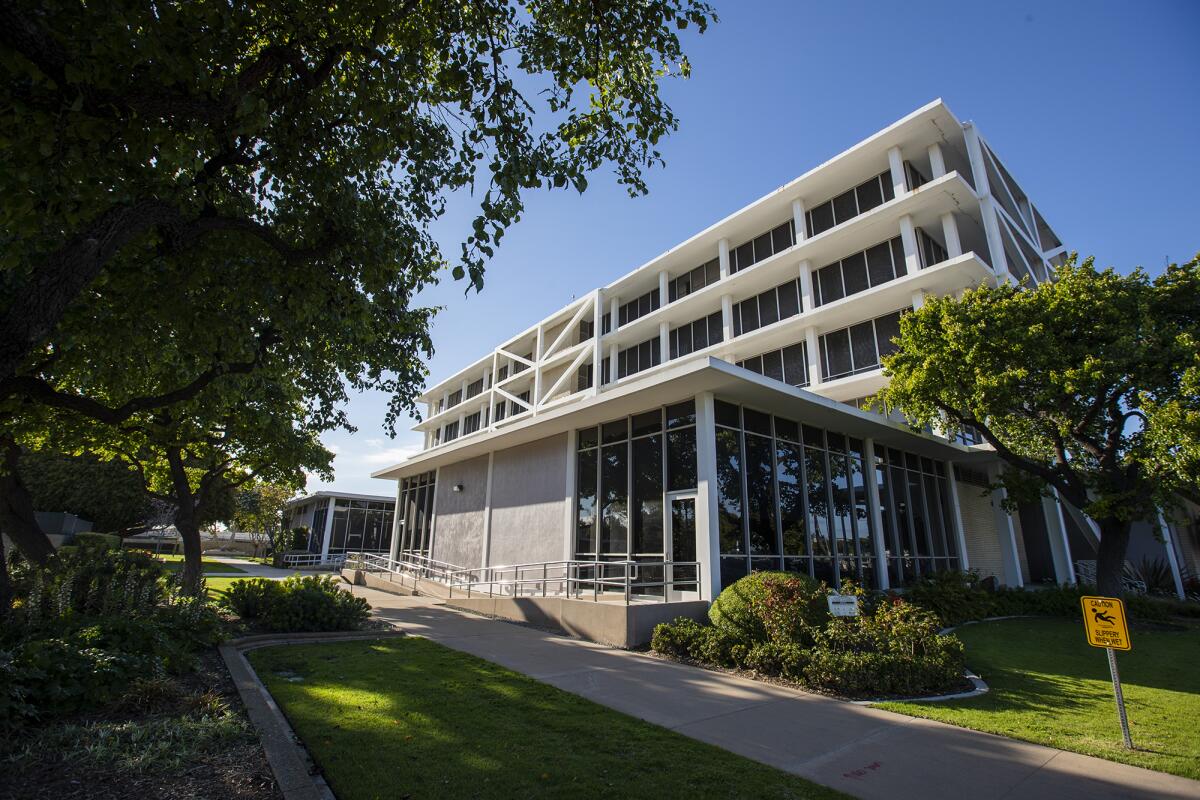Costa Mesa grapples with new housing law, adopts in-lieu fee that could thwart affordable units

- Share via
The Costa Mesa City Council, which unanimously approved an affordable housing ordinance in April, then revisited it in June, argued over the tenets of the law during yet another hearing last week before lurching forward in a narrow, 4-3 vote.
Officials were asked at an Aug. 6 regular meeting to establish a schedule of in-lieu fees developers could pay instead of setting aside a percentage of units on a residential project for low- or very low-income tenants, a requirement under the law passed in April after a second reading.
But the scope of the discussion soon widened as council members responded to an earlier plea — made by Councilwoman Arlis Reynolds during a June 18 meeting that appears to have been another second reading of the item — to consider lowering the number of units that would trigger the affordability requirement from 50 to 30.
Reynolds argued at the June meeting that only 48% of areas defined as “housing opportunity sites” in the city’s housing element could support projects large enough for the new law to be applied.
At last week’s meeting, she referred to “two Costa Mesas,” making a distinction between a city accessible only to those who can afford high market rates and those already living and working in the city who are unable to keep pace with rent hikes and in desperate need of more affordable options.
“This is our opportunity to decide which Costa Mesa we’re trying to support with our construction projects — which Costa Mesa are we building for?” said Reynolds who, along with Councilwoman Andrea Marr, supported a 30-unit trigger.
Councilman Manuel Chavez favored a 50-unit threshold, imagining many developers wishing to avoid the diminished profitability of building housing for low-income tenants would simply focus on projects just below the trigger.
“I have faith in human nature that if a threshold is lower, like 30, we’ll see a bunch of 28-unit apartments be built so folks don’t have to do any in-lieu fee or build on site,” he said. “Renters have been hurt the most with the lack of building. The only thing we know will fix an issue with demand is supply.”
The discussion over what kind of in-lieu fees Costa Mesa would require from developers as an alternative to building on-site affordable housing was just as hotly debated on the dais.
Los Angeles-based consulting firm Keyser Marston Associates presented a plan that would require developers who do not build affordable units on site to pay $19.50 per square foot of the equivalent total area, if they were building projects with a density of 60 or more units per acre. Those of a lower density would be assessed an in-lieu fee of $13.80 per square foot.
A line was drawn between those who wanted to make the fees higher, so that builders might be motivated to see building affordable units on site as a more attractive option, and those who felt a lower in-lieu fee might encourage developers, even those with market-rate ambitions, to build in Costa Mesa.
After a lengthy discussion on both sides, Marr made a motion to accept the consultant’s in-lieu fee schedule but to review it after a two-year period and to lower the ordinance’s unit threshold to 30. Reynolds seconded that motion.
Councilman Don Harper made a substitute motion to take no action and leave it up to city officials, in their negotiations over large-scale development agreements, to set their own terms. He found no backers.
Chavez put forth a second substitute motion that retained the 50-unit threshold but established a flat in-lieu fee of $10 that would be reviewed by the council after two years. Consultant Kathe Head warned a low fee might completely disincentivize the building of affordable units on site.
But Chavez held firm.
“I would rather have a lower fee for two years and get a boom of housing and then raise the fee than put the fee too high, have no one build and then lower it,” he reasoned.
Ultimately, his motion drew support from Harper as well as Mayor Pro Tem Jeffrey Harlan, Mayor John Stephens.
“I want there to be production,” Stephens said. “I want there to be housing. I want there to be places that people can live, and live affordably, in Costa Mesa. I think we all do. It’s just a tiny difference in approach about how to do it.”
All the latest on Orange County from Orange County.
Get our free TimesOC newsletter.
You may occasionally receive promotional content from the Daily Pilot.










